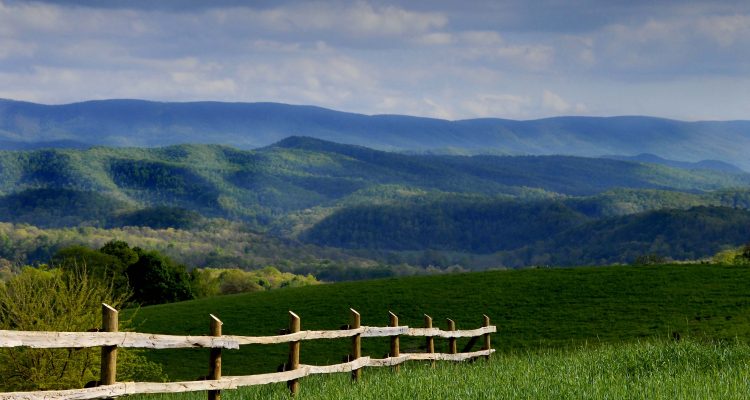We give the mountains our names / and they stand still… — Irene McKinney
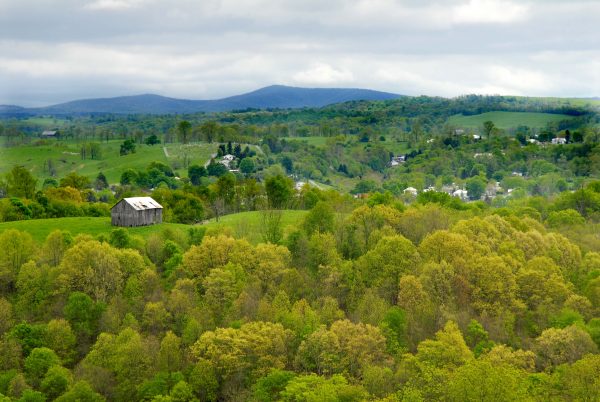
Mountains called Nathaniel, Coal, Cheat, Blair.
Rivers called Potomac, Kanawha, Greenbrier, New, Elk, Ohio.
Remembered places: Droop, Green Bank, Arthurdale, Blennerhasset, Matewan.
Beauty and tragedy, heroism and courage stitch the patches of our history’s quilt.
These are not easy times, nor were theirs. 1863 not easy
— western Virginia families split by war. How speak ease
with typhus, women and children outnumbering
men, growing death lists of the young
lost at Antietam, Cloyd’s Mountain, Winchester?
Nor are ours easy. Jim, in his chinos,
panhandling the crossroads; families
at the dump, weather channel wailing, mother
nature mainlining, new diseases spawning.
Our forebears knew to dream and begin again — a cloud of witnesses
watching even now — for there are “frail forms fainting” still at our cabin doors.
Forgotten and remembered names — let our fingers trace their scars
on the skin of who we might yet be.
Shawnee, Cherokee, Hopewell, Adena, our ancients
dreamed, knew god, knew art, knew words:
“Who is there to mourn for Logan: not one.”
We mourn the roads not taken, and yet … let that go, celebrate
the roads we have taken: Skygusty, Squirrel Alley, Pickle Street,
Sally’s Backbone.
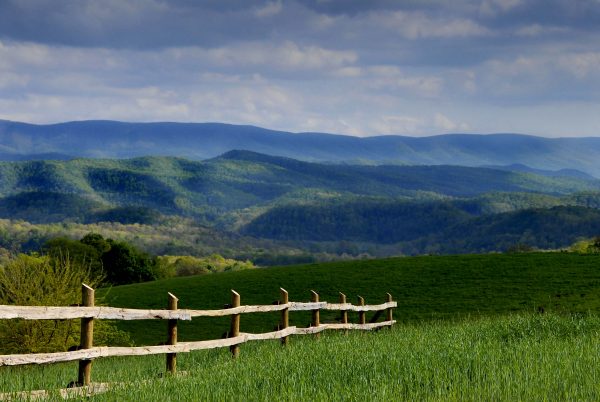
Who blazed these paths? Van Meter, Morgan, Zane dared
these vast shadow forests of unending mountain. Dozens, hundreds,
thousands followed carving their square of sky from these eastern hardwoods.
They dreamed the wild could begin a home, and so wild we began.
Between early wars, forgotten settlers battled bears and painters, drought and flood,
speculators, loneliness. Yet some from those years remembered: Gass in Wellsburg,
with words, captured Lewis and Clark, Booker T. learned freedom here,
dreamed it forward for generations of others, and some rode the very steamboats
dreamed by James Rumsey.
Steamboats? In 1851, a Swedish nightingale stepped off one and sang — Jenny Lind
sang, and only blocks away, a century later Eleanor Steber sang, lured angels with
Strauss, Wagner, Rossini.
Throughout these hills, song and music: Blind Alfred and George Crumb, Melvin Wine
and Hazel Dickens, Chu Berry, high and low notes, each could hit them all, hit them,
like Brett, out of the ballpark.
West Virginia: brick streets and churches dreamed and begun here.
Here Alexander Campbell and Matthew Clair dreamed God
and, keeping their paths straight, thousands joined them. Who knows even now
where the line is between dream and fact, between Creation and Big Bang?
Free mail and 4-H camps dreamed and begun here.
But this thirty-fifth state was first dreamed in bloodshed between north and south.
Between east and west, the old Commonwealth torn and so West Virginia arose:
statesmen and heroes fought for family, tradition. Stonewall stood on the wrong side,
where there was no good side, but courage and tactical skill knew no better. And
Pierpont, Boreman, Carlile, likewise, with courage and skills of language,
forged our new state, this very one upon which we stand.
Anna Jarvis dreamed and began Mother’s Day here.
Golden Delicious apples dreamed and begun here.
Here at Big Bend, John Henry, to whom even poets bow their heads,
hammered hard and hammered fast.
And Chuck Yeager flew fast, faster than these sentences, than even their sound.
Homer Hickam dreamed the sky itself, shaped rockets, then words to tell his story.
And Adrian Melott reached between the stars to the dark matter, dreamed the
very structure of the cosmos.
John Nash dreamed numbers in his beautiful mind, played games where good money
trumps greed. And Mary Lou Retton dreamed a single number, a perfect 10.
Electric railroad dreamed and begun in Huntington.
Minnie Harper dreamed and became first African-American woman in legislature.
In Pocahontas County, beyond the beyond, Pearl Buck and Louise McNeill conjured and
crafted words to dream beyond that beyond, words known now around the world.
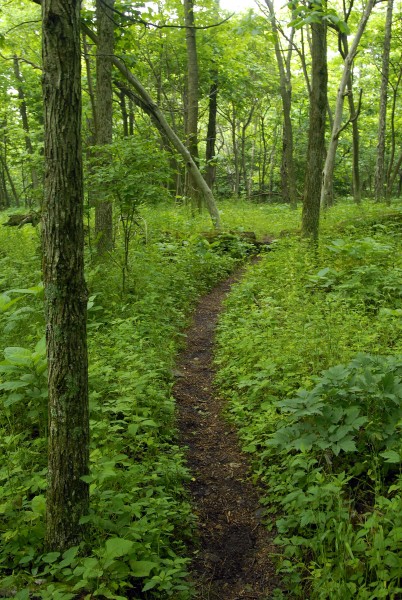
Dreaming and beginning . . .
All our heroes for the working class: Sid Hatfield, Blizzard, Mother Jones, Reuther,
Hechler, Larry Gibson . . . shoulder to shoulder. Look close at the bullet holes in those
courthouse steps in Welch, those same holes in Larry’s outbuildings. Look close at the
big hat with the little woman and the fiery voice.
And all the Good stand with us still. We hear them singing.
Remember, too, the forgotten whose names are scratched in stone in
moldering cemeteries just over yonder where the blackberry blossoms: Lloyd who
showed me the old Miller place, a Maiden’s Blush apple gone wild. Roy who
showed me a spring cold as ice in hay-making August. Norma who
showed me the widow’s mite in towers of food. Gwen and Melvin who showed how
country folks define gentleman, lady.
Maestro, let us play a tucket on those fiddles! Let them ring!
Let the bells chime! Let a sanctus slide, echo down the Ohio,
up the Kanawha, the New, the Elk. Sing those liquid notes of the rivers.
“Mountain water makes the difference,” the old slogan said,
and still does. Moonshine and spring-shine, cold and fire have tempered our blood
and here we yet stand. Here we dream and begin again.
So whoop it up, this celebration, dream it big! Add names
to this song, yours, mine and all those to come.
Do as our ancestors across the waters did — light bonfires atop hill and mountain,
let the message travel from Charleston to Bluefield, from Williamson to Harpers
Ferry, and back to Wheeling, that mountaineers are still free!
Someone carve a story, a blueprint of just what might be done, what might be said. Someone scavenge the detritus of the flea market, take hammer or brush, assemble new
dreams for rust and whitewash, Annunciations, the Fulton Dairy Queen.
And on the back porch, Bonnie and Paul once again spin us the old tales new:
the preacher on your mother’s lap, the monster stick that hooks a bear.
Listen again, the old tunes,
the long ago mornings, the lost ones . . .
Listen to Wilson Douglas, Phoebe Parsons, Harvey Sampson whose fiddle
leads us through those Yew Piney mountains.
Scrape and trill, drone and run like a river through the mountain’s heart.
One hundred fifty years and hundreds more to come . . . think of it! Take up the patterns
of those who’ve given us their lives. Take up the patches of this history quilt, this
dream-flagged quilt. Wave it high and walk proud these crumpled folds and crags of
mountain and valley, these green, rolling hills. And let no man haul it away, no
coward with a bankroll buy us out, no circus fast-talkers take what’s ours.
And what a dream — still ours, still new, just beginning. Again, that bell, again those
trumpets, fiddles, drums, hands together, how sweet the sound. Let us clap! Let us
sing! And though we know, President Kennedy, that the sun, indeed, does not always
shine here in West Virginia, you were right — these, our people, always do, and
always will. West Virginia . . . you are my home, our home. Forever may you sing,
and forever may you shine.
This work appears in the book A Song For West Virginia, published by Quarrier Press. It is available for purchase at the Wheeling Artisan Center, or online from West Virginia Book Company.
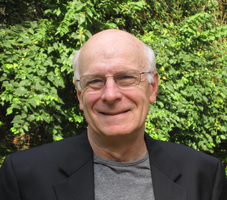
Marc was born in Indiana, but his Ohio Valley roots go back through Bethany College in the early 1970s. He is an author and storyteller, and has taught writing at both the University of Pittsburgh’s Cathedral of Learning and the three-room Sand Hill Elementary in Marshall County. He lives in Ohio County.


